News
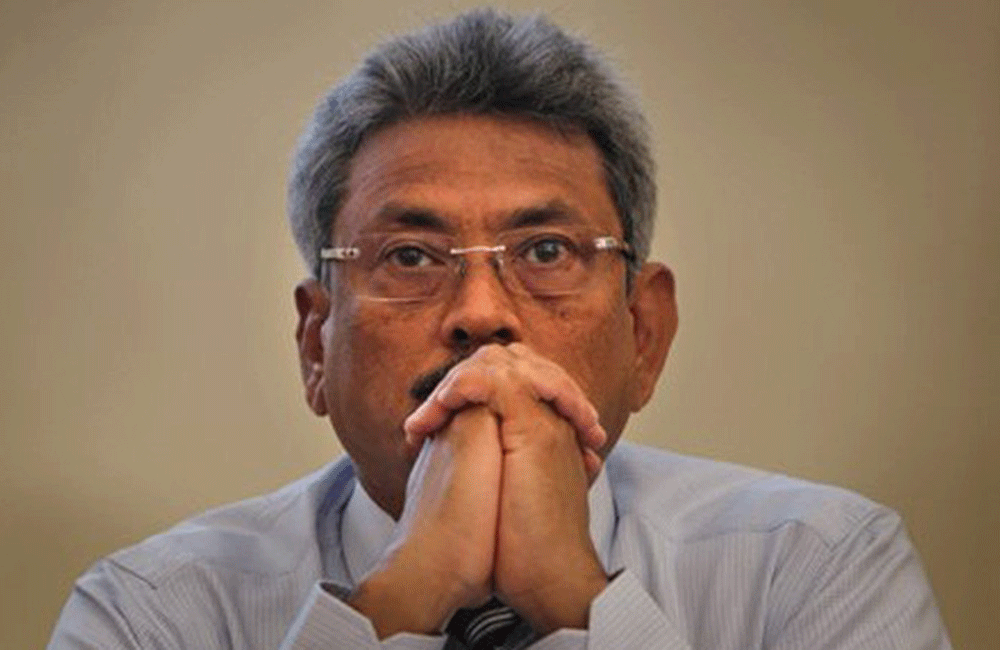
Gota to boycott March 8 Rally!
Former Secretary of Defence, Gotabaya Rajapaksa is likely to boycott the ‘Pohottuwa’ rally to be held on March 8 in Kandy sources say. According to reports he has not been invited for the rally and has also decided to not attend even if invited. Rajapaksa has said he would not appear on political stages until the favourable time.
Sources close to Rajapaksa say he feels it is too early to appear on political stages and would only do so when he feels it is the correct time to do so. While the country is seeking a change, Rajapaksa is said to believe the necessary change will not be delivered by the budget which is to be presented today.
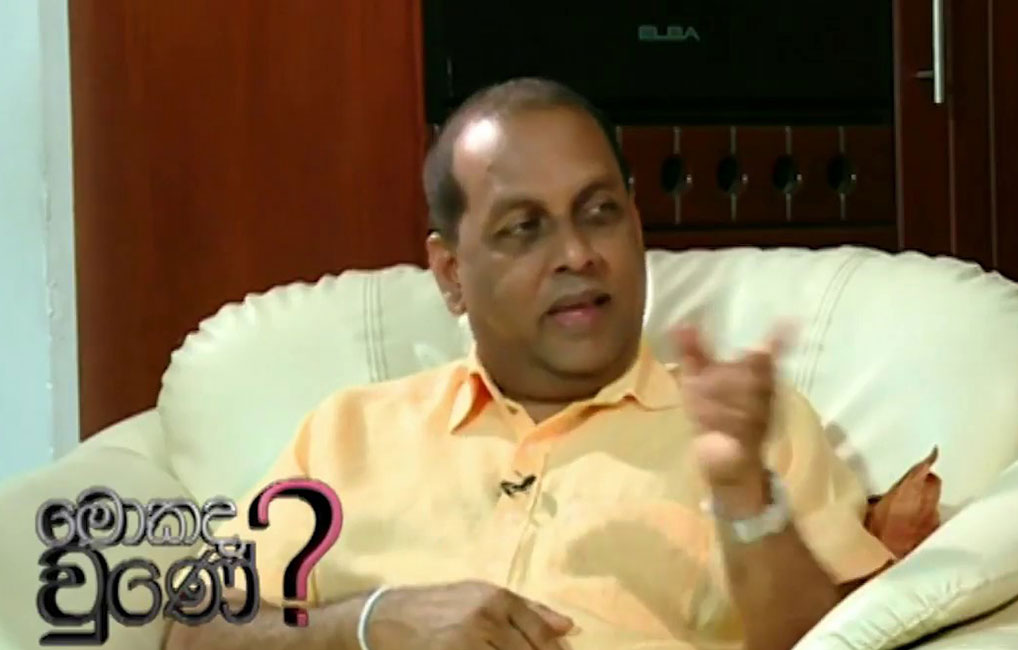
Mahinda Amaraweera to make a decision!
United People’s Freedom Alliance, General Secretary Mahinda Amaraweera says he will announce a new political decision in the coming week.
The Former Minister has made this statement in an interview with Sinhala weekly, the Sunday Lankadeepa.
According to the report, Amaraweera is said to have stated that the public has a deep mistrust of politicians and are disgusted by them.
Therefore Amaraweera is set to embark on a different political journey, the report claimed.
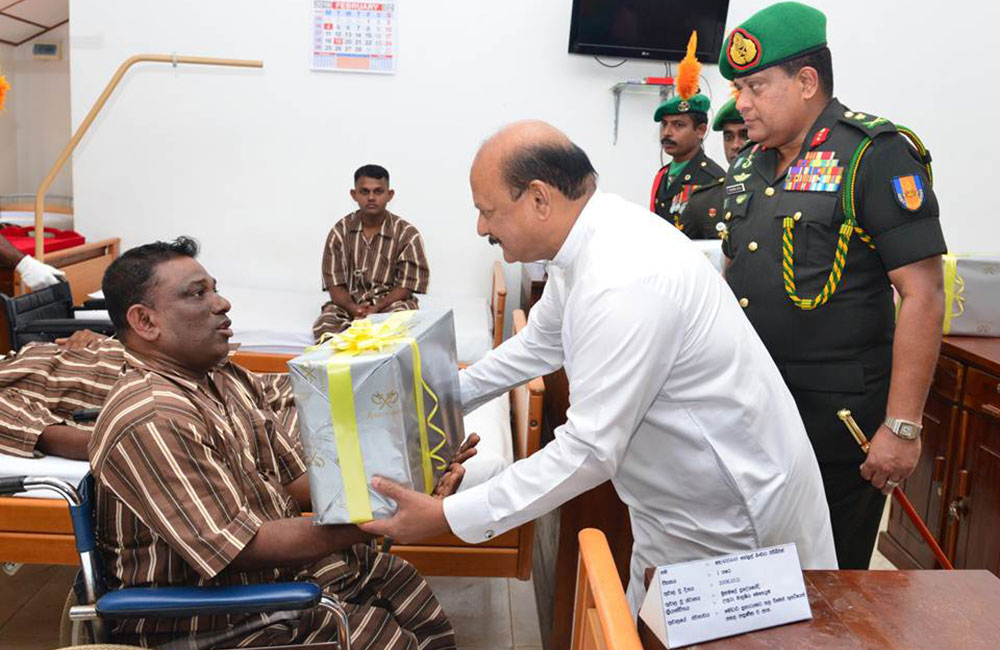
Valiant GR War Heroes, Now Disabled & Cared for Life Get New Therapeutic Swimming Pool in Senapura
Dozens of Gajaba Regiment (GR) War Heroes who suffered permanent injuries and turned differently able, yet receiving rehabilitation and recuperation under the care of the Headquarter Battalion (HQBN) camp of the Gajaba Regiment in Senapura on Saturday (23) were the beneficiaries of a state-of-the-art new therapeutic Swimming Pool that remained a long-felt medical requirement for hydrotherapy treatment.
The Ladies Chapter of the Chamber of Young Lankan Entrepreneurs (COYLE), chaired by Mrs Shehani Piyasena footed the entire phenomenal cost of this construction at the request of Mrs Sujeewa Nelson, Chairperson, GR Seva Vanitha Unit at the invitation of Major General Shavendra Silva, Colonel of the Regiment, Gajaba Regiment and Chief of Staff of the Sri Lanka Army (COS) and Colonel Jananka Vithanachchi, the Commanding Officer of the HQBN.
Hon. Sarath Ekanayake, the Governor of North Central Province as the Chief Guest representing, HE the President and Lieutenant General Mahesh Senanayake, Commander of the Army were greeted to a warm welcome by the Colonel of the Regiment, GR and the HQBN Commanding Officer on their arrival for the inaugural ceremony of this much-needed medical therapy. A few minutes later, both the Governor and the visiting Commander of the Army, together with Senior Officers visited the wards where GR War Heroes are undergoing rehabilitation after they turned permanently handicapped. The day's protagonists gave away gift parcels to the inmates and shared a couple views with some of them while inquiring into their well-being.
The climax of the day's event then began to draw the attention as the Governor, Commander of the Army, Colonel of the Regiment, GR, Mrs Shehani Piyasena, Chairperson, COYLE, Mrs Sujeewa Nelson, Chairperson, Gajaba Regiment Seva Vanitha Unit, together with several Senior Officers walked up to the new swimming pool complex to unveil a plaque and cut a ribbon before the new facility was declared vested in those GR War Heroes who sacrificed their legs and limbs to protect the territorial integrity and unitary status of this island-nation. This new swimming pool, formally handed to GR by COYLE representative, is 25 meter long and equipped with 8 swimming lanes and the opening was symbolized by a display of swimming capabilities of those physically-handicapped War Heroes.
Commander of the Army in appreciation of the COYLE's great thoughtfulness and generosity awarded a memento to Mrs Shehani Piyasena of the COYLE at the same occasion and spoke high of their silent gesture of gratitude as the COYLE fights shy even to disclose the exact cost of the project.
Regimental Senior Council Members, Regimental Centre Commandant, Brigadier Harendra Peiris, Deputy Centre Commandant, several other senior officers, Other Ranks, school children and villagers of the area also were present at the occasion. Towards the end of the ceremony, a few selected school principals were given packs containing some valuable sports items for use in their schools.
Gajaba Regiment, as one of the premier infantry outfits of the Sri Lanka Army, has shown the epitome of valour, courage and sacrifices for the sake of the motherland during its 35 years long, yet proud and eventful history. This valiant Regiment suffered the highest number of casualties and supreme sacrifices during the three-decade long brutal terrorism. Gajaba War Heroes who turned physically-handicapped are in this way taken care by the Headquarter Battalion of the Gajaba Regiment which was established on 27 May 1994.
https://casite-790485.cloudaccess.net/news?start=4284#sigProId830fa032bb
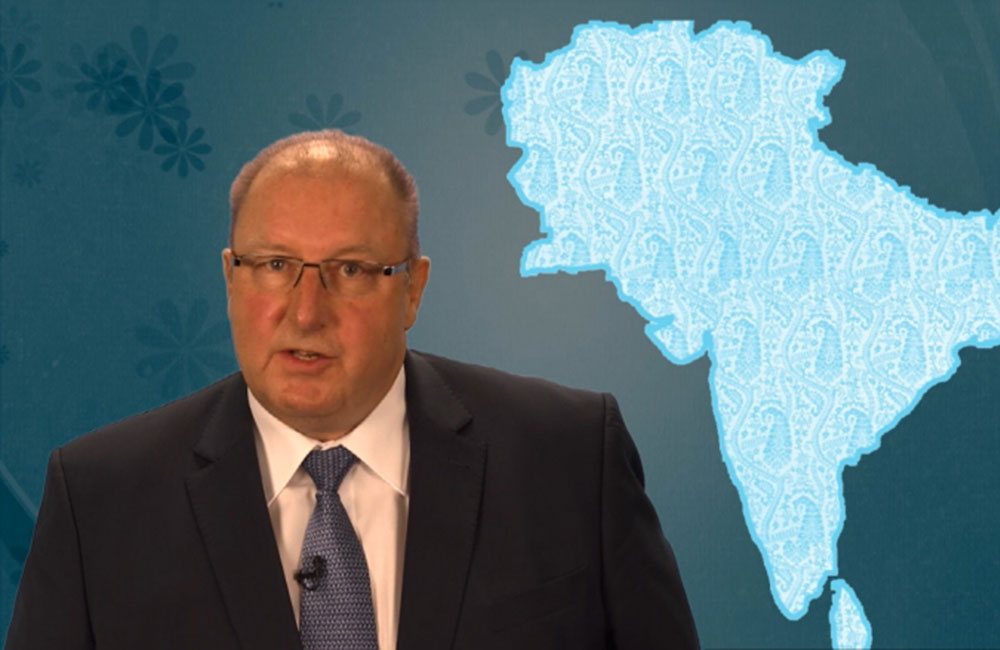
World Bank VP lauds Mangala on economic reforms
The World Bank Vice President for the South Asia Region, Hartwig Schafer said that he congratulated Finance and Media Minister Mangala Samaraweera on the many reforms he has "championed" in the last year, including the Inland Revenue Act and the National Audit Act.
Schafer met with Samaraweera yesterday to discuss the many challenges that still remain
such as increasing foreign direct investments as well as improving the country’s competitiveness and increasing its private sector participation.
Finance Minister Samaraweera had briefed the visiting World Bank VP on Sri Lanka’s strong progress in Doing Business and Human Capital Indicators and pointed out that Sri Lanka leads the region in the Human Capital Index. Furthermore, he had stressed that a lot more investment is planned for education, health, and social service sectors in the future.
During his three-day visit, Schafer will meet President Maithripala Sirisena, Prime Minister Ranil Wickremesinghe, the Mayor of Colombo Rosy Senanayake and other senior government officials.
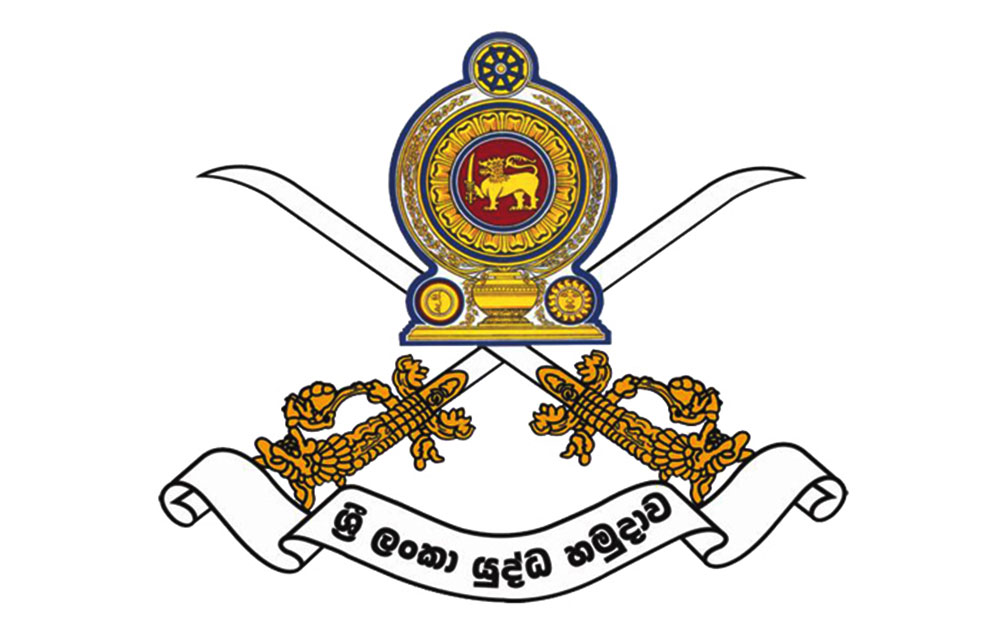
Senior Army officer issues orders to Army Wives!
The Senior Army officer in Charge of the Eastern Province is said to have ordered the wives of Senior Officers reporting to him to attend all activities and events attended by his wife.
According to authoritative sources, the said Senior officer had called 40 Senior officers and said their wives must attend these events. He is said to have threatened to implement strict regulations on the use of official vehicles and other privileges enjoyed by these officers should their wives fail to act according to the order.
However the wives of the Army officers under him are said to be questioning as to how their husband’s senior officer can issue orders to their spouses in such a manner. With many wives living away from the area, they are finding it difficult to attend these events and meeting, sources said, calling the order an unfair move on the part of the senior officer.
The same officer is accused of forcing the nearly 300 strong officer cadre reporting to him to provide sponsorships or advertisements amounting to Rs. 20 000 for the annual event of his regiment Mela held to collect funds for the Regiment. Many officers unable to raise such amounts have been left to shell out the required amounts from their own pockets. According to sources the senior officer appears to have gone ‘mad’ with power to think he can issue orders not only to his officers but to their family members as well.
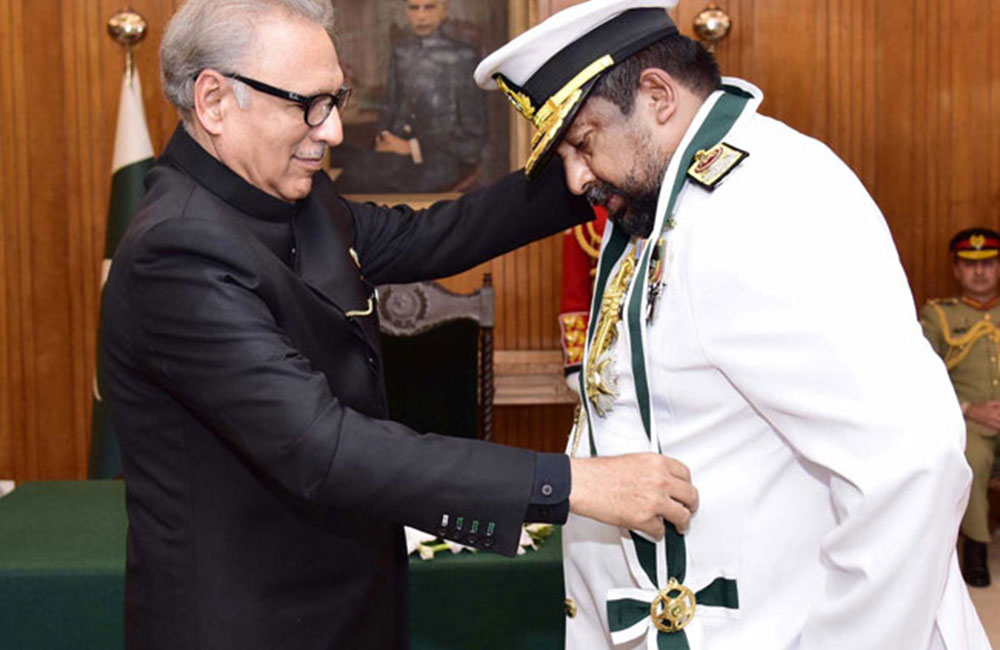
Navy abductions case suspect CDS Wijegunaratne awarded military medal
A key suspect in the case of 11 abducted youth by a Navy ransom gang, Sri Lanka’s highest ranking military official, Chief of Defence Staff Ravindra Wijegunaratne has been awarded the Nishan-e-Imtiaz (Military) Medal by the President of Pakistan at a Special investiture Ceremony held at Islamabad, Pakistan on Wednesday (13).
Wijegunaratne was the first Sri Lankan Military officer to earn BSc (Honours) (War Studies) degree from Karachi University in 1995. He is considered as an expert in “Asymmetric Naval Warfare” and “Small Boat Operations” and founder of Naval Commando Unit of Sri Lanka Navy, Special Boats Squadron (SBS).
Wijegunaratne is He is a regular visiting lecturer to Pakistan Navy War College, Lahore to lecture on his battle experiences and asymmetric Naval Warfare. His efforts to improve Military to Military relationship between two countries as Commander of the Navy and later as the Chief of Defence Staff have been highly recognized by Pakistan. In 2018, with his initiative, Military to Military Staff talks between two countries was elevated to a Defence Dialogue.
The Nishan-i-Imtiaz (Order of Excellence) is the highest honour given to any civilian in Pakistan based on their achievements towards world recognition for Pakistan or an outstanding service for the Country. The award is not limited to citizens of Pakistan and while it is a civilian award, it can also be awarded to military personnel and worn on the uniform.
It is regarded as the highest award one can achieve in Pakistan since higher award Nishan-e-Pakistan is awarded only to foreign Heads of States. For those in the Military, it is given after distinguished service and is also the highest award that can be awarded to those at the rank of Generals (Army) Air Chief marshals (Air Force) and Admiral of Navy, Coast Guard, and Marines.
WIjegunaratne is, however, a suspect in the high profile abduction case of 11 youth between the years of 2008 - 2009. He is accused of harbouring the main suspect in the case Chandana Prasad Hettiarachchi alias Navy Sampath and helping him to flee Sri Lanka during Wijegunaratne’s tenure as Navy commander.
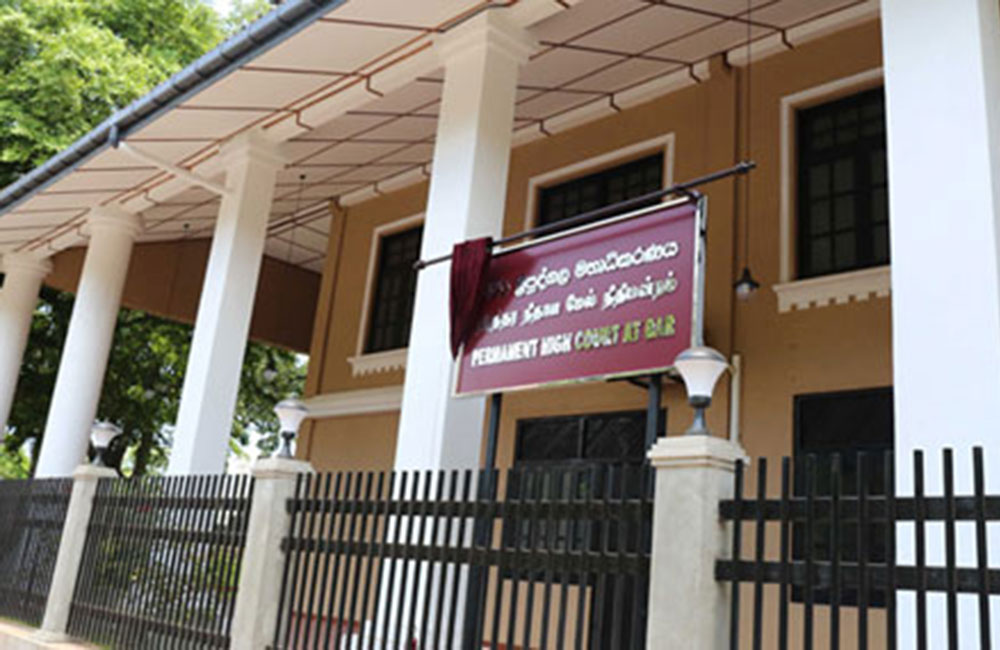
Second Special HC to be set up at Hulftsdorf court complex
The Ministry of Justice and Prison Reforms has decided to set up the second Permanent High Court Trial-at-Bar at the same location where the first Special High Court was established. According to Secretary of Justice and Prison Reforms R.M.D.B. Meegasmulla necessary steps would be taken to establish the second Special High Court without delay.This would be undertaken in accordance with the authority conferred to the Justice Minister by the Judicature Act No. 2 of 1978.
The judges for the second Special High Court had already been appointed, however, the location of the court remained an issue. The first Special High Court was officially set up on 21st of August 2018 at the Hulftsdorf court complex.
The Special High Courts are being set up hear the cases related to fraudulent acts, misuse of public property and acts of bribery.
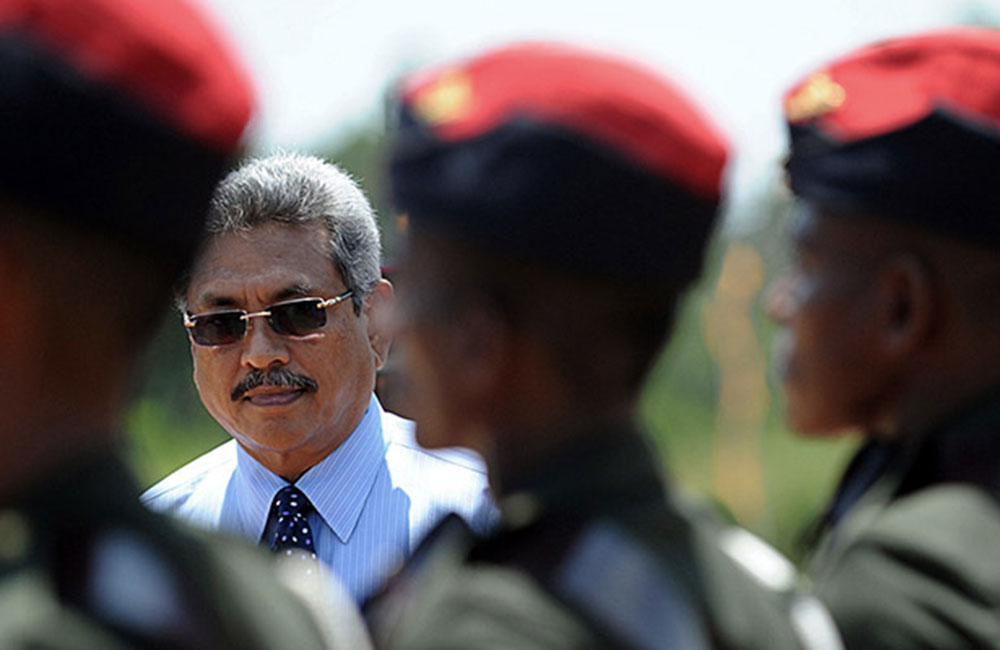
Gotabaya acknowledges use of white vans to “take in” suspects
Gotabhaya Rajapaksa made the rare admission of the government's controversial counterinsurgency tactics in a recent interview with a Colombo based English daily.
The shocking claim comes a week after his sibling, former president Mahinda Rajapaksa, acknowledged for the first time that the troops committed mass crimes during the war.
In Sri Lanka, with tens of thousands of unresolved enforced disappearances, “white vanning” is a euphemism for abduction and torture - based on the vehicle commonly used.
The former defence secretary had said that Intelligence agencies used white vans claiming that such methods have been used in Sri Lanka for a long time.
When there was a suspect, he was taken in for questioning through such means,” Gotabhaya Rajapaksa told Daily Mirror.
“It was not something introduced by me. These methods have been adopted all over the world. Maybe our intelligence agencies used Hi-Ace vans which are white. I did not introduce it. It happened under all the previous Governments. If you take the violence during the JVP era, everybody, barring the very young people, knows how youth were whisked away by unknown people all over the country.”
His reference to the “JVP era” was the late 80s when a Sinhala youth uprising led by the Janatha Vimukthi Peramuna (JVP) was militarily crushed with extrajudicial killings and abductions.
Gotabhaya Rajapaksa, a senior military officer during the time, functioned as the military coordinator in Matale district in Central Sri Lanka where the second biggest mass grave containing 154 human skeletons was found in November 2012.
'Normal procedure'
He claimed that the feared practice of White Vanning was used exclusively against Tamil Tigers waging a war for self-rule. Rajapaksa lamented that he is being ‘pinpointed’ for the continuation of an age-old practice, which wasn’t “normal procedure”.
“I do not know why I am being pinpointed today. During our time this had never been done to abduct any political opponent, which was not the case in the 88/89 period.
Most people above 30 years of age remember what happened during that time. What happened during our time was only to counter the activities of deadly terrorists.
By 2005, there was a huge network of the LTTE in the south. They had infiltrated the south in a big way.
They were able to kill so many people like politicians and military personnel as a result.
They were fighting all over the country. They had an intelligence network and armed caches in most places in Colombo and the suburbs.
We had to trace them including suicide cadres, spies etc. When you fight terrorism, you cannot stick to the normal procedure.
They were fighting in a different way using clandestine guerrilla methods. We had to counter that in a similar manner. That is the way that the intelligence agencies work.” (JDS Lanka)
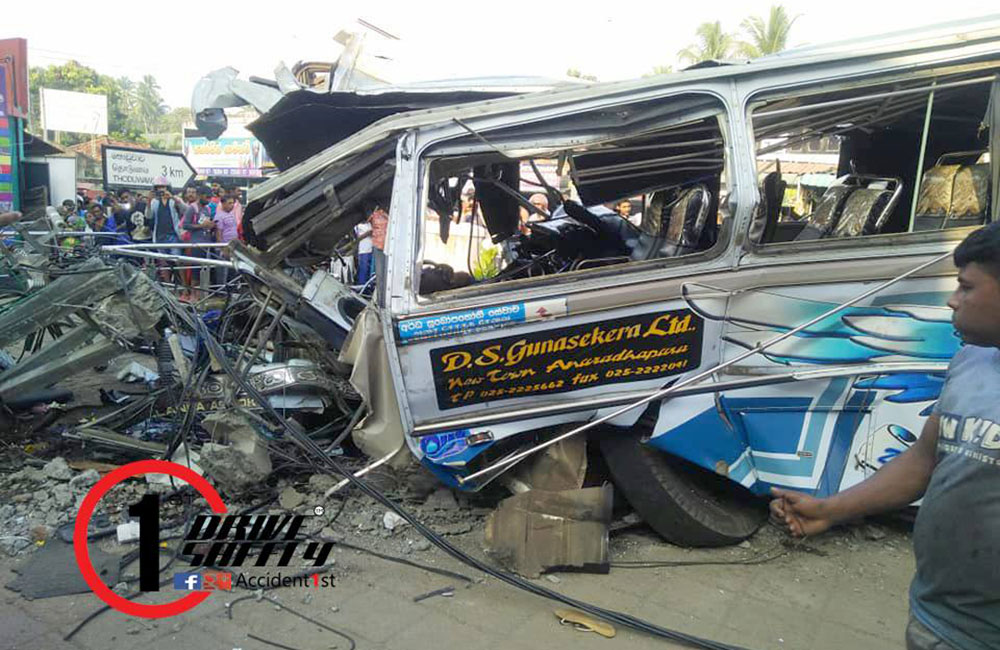
Three killed in horror D.S Gunasekara bus crash!
Three people lost their lives today when a Colombo bound Vavuniya bus crashed into a bridge and a transformer near the Mahawewa junction in Marawila around 4.30 am today.
According to the Police the bus had attempted to overtake a lorry while travelling at a high speed causing the driver to lose control of the bus.
The bus belongs to the D.S Gunasekara transport company and has been left in a mangled state.
The horrific crash killed four individuals while 19 others suffered serious injuries. Among them are three Army soldiers, one Navy personnel and four women.
Police say some passengers were left trapped in the bus for a significant amount of time.
This may result in higher fatalities they said. Meanwhile the conductor of the bus is said to have fled the scene following the incident.
Marawila Police are carrying out further investigations into the incident.
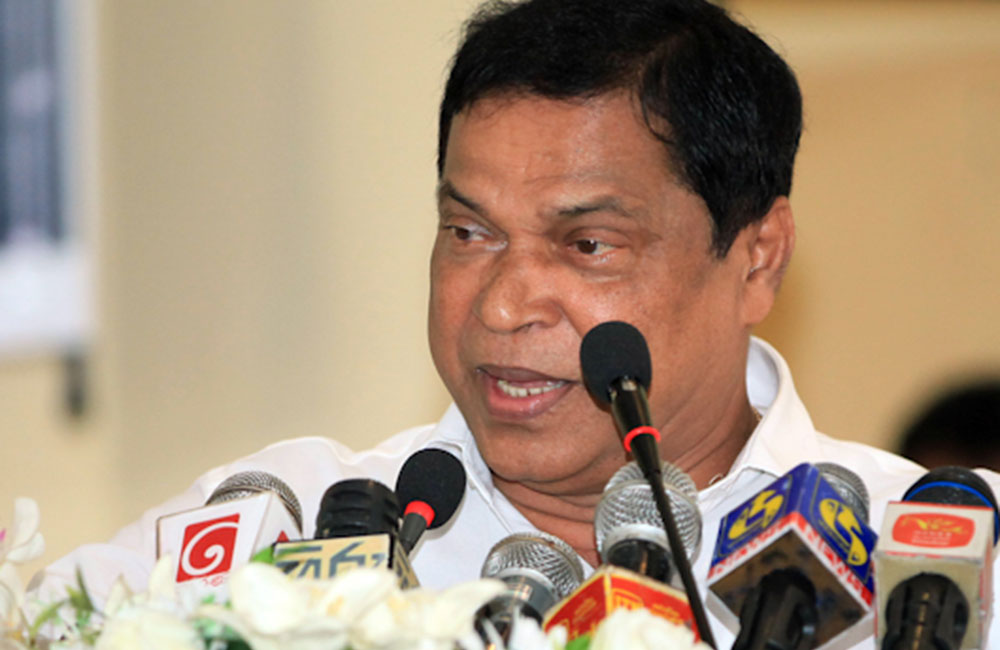
Dayasiri cannot hold disciplinary inquiries for us : Piyasena Gamage
MP Piyasena Gamage says Sri Lanka Freedom Party (SLFP) General Secretary Dayasiri Gamage cannot hold disciplinary inquiries on his conduct.
“There are many others the party should take action against if so” he said adding that while Dayasiri constantly crossed over, it was SLFP members such as himself who ensured the win of the party.
The MP made these comments while meeting journalists at his home in Neluwa, Medagama.
“If he is conducting disciplinary inquiries he should first hold one against the President” Gamage said. According to him the SLFP does not have a history of precedence to hold disciplinary inquiries in such a manner.
He also said he would express his support for a National government if the need arises in the future. “It doesn't matter if I receive a Ministerial portfolio or not, I am always dedicated to which ever party I belong to” he said.
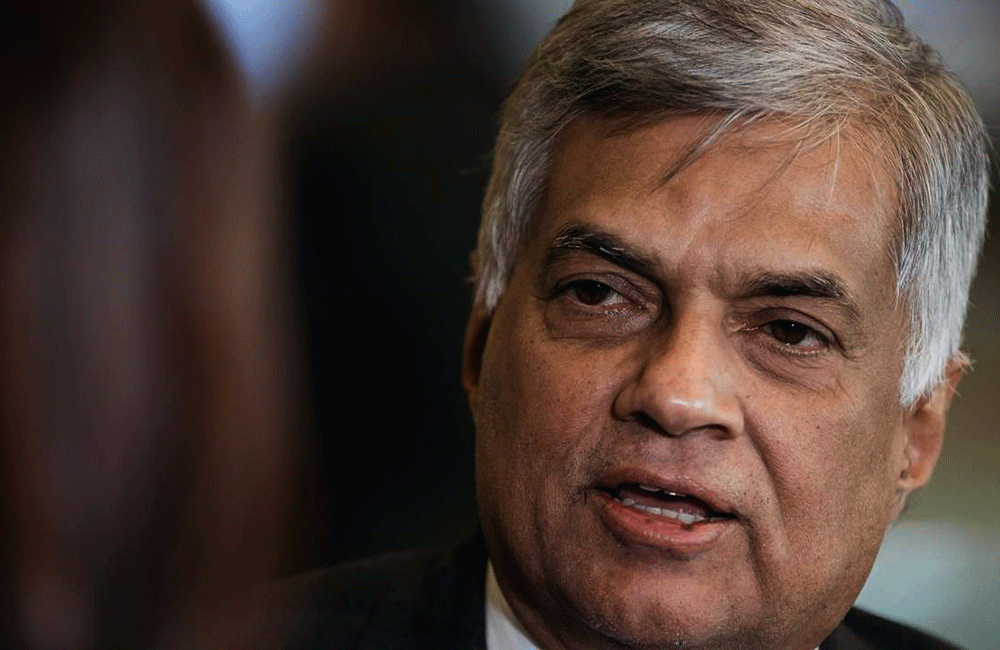
I am the Presidential candidate says Ranil Wick!
Prime Minister and Leader of the United National Party Ranil Wickramasinghe has announced that he would definitely contest in the next Presidential elections.
According to weekly sinhala newspaper ‘Aruna’ he has made this announcement to a group of close associates recently.
The report further states Wickramasinghe had summoned a number of school friends, political associates, businessman and professionals on Wednesday (13) and made this announcement. (Aruna)
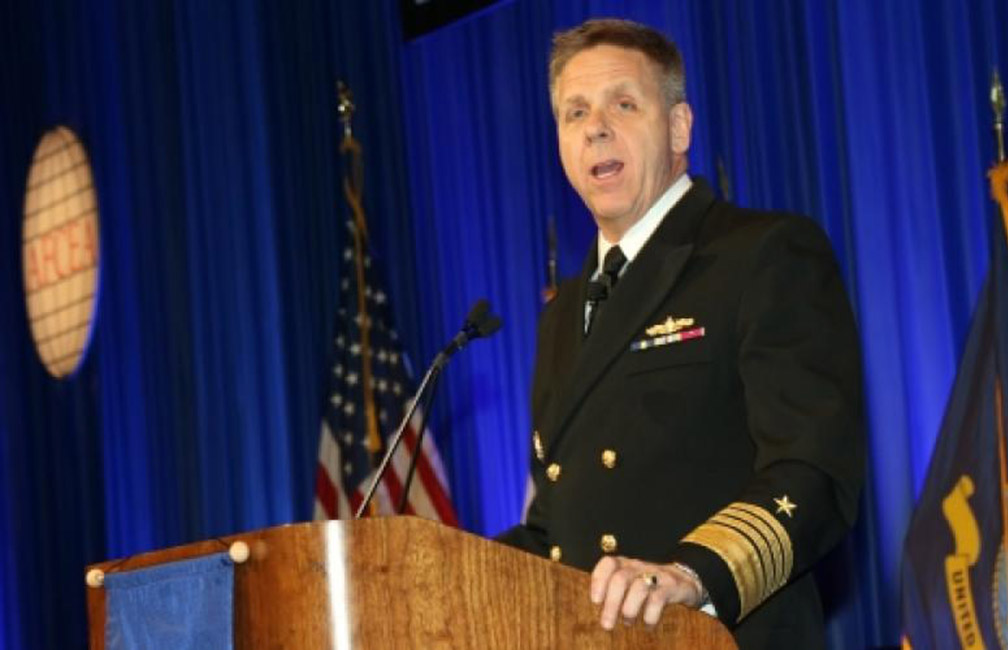
Pentagon seeks sustained engagement with Sri Lanka
Amid the increasing Chinese influence over the strategically important Indo-Pacific region, a top Pentagon commander has advocated sustained US engagement with Sri Lanka, despite the political and ethnic turmoil in the island nation, posing a challenge to their ties.
“Sri Lanka remains a significant strategic opportunity in the Indian Ocean, and our military-to-military relationship continues to strengthen," US Indo-Pacific Command chief Adm Philips Davidson told the Senate's Armed Services Committee during a Congressional hearing.
"The political turmoil and ethnic tension between the Tamil and Sinhalese populations, however, remain drivers of instability and potential obstacles to continued growth in our partnership,” he deposed.
Moreover, Sri Lanka has handed over the deep water port of Hambantota to China on a 99-year lease due to its mounting debts to China, which has caused international concern, he said.
Despite the political upheaval, it is in America's interests to continue military collaboration and cooperation with Sri Lankan Forces, he added.
The United States Indo-Pacific Command (USINDOPACOM) cooperation with the Sri Lankan military centers on building capacity in maritime security and maritime domain awareness, humanitarian assistance and disaster relief as well as humanitarian de-mining, medical assistance, and peacekeeping operations, he said.
Increasing navy-to-navy engagement with Sri Lanka will be a USINDOPACOM focus in 2019, he added.
Davidson said the Sri Lankan Navy is a well-trained and professional force with the potential to contribute to multi-lateral maritime interoperability in the Indian Ocean.
The recent transfer of an excess US Coast Guard cutter to Sri Lanka in August 2018, along with additional platforms from Japan and India, provide the Sri Lankan Navy greater capabilities to contribute to regional maritime domain awareness initiatives, he said.
“Going forward, it is necessary to sustain engagement with Sri Lanka, particularly the navy, and construct a multi-lateral approach to capacity building with like-minded partners to rapidly enhance the Sri Lankan Navy's capabilities,” Davidson said.
According to the top Pentagon Commander, Beijing is exploiting growing debt burdens to access strategic infrastructure in the region.
In December 2017, Sri Lanka handed over control of the newly-built Hambantota seaport to Beijing with a 99-year lease because Sri Lanka could no longer afford its debt payments to China, he added.
Page 358 of 531

